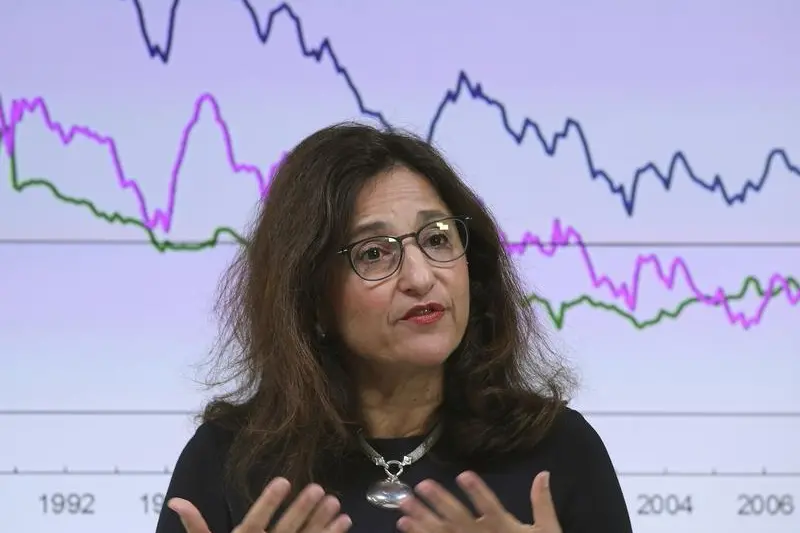PHOTO
(Recasts after Shafik comments, new quote)
By Jemima Kelly
LONDON, Sept 28 (Reuters) - Sterling dipped back below $1.30 on Wednesday after a Bank of England policymaker said she expected the central bank would "at some point" need to add more monetary stimulus to Britain's economy to cushion the blow dealt by Brexit.
BoE Deputy Governor Minouche Shafik - who will be stepping down from the Bank's monetary policy committee next year - said a 2016 rate cut would hinge on economic data, but that she would rather act pre-emptively than "be on the back foot and do too little too late".
Shafik's comments contrasted with those of fellow MPC member Kristen Forbes, who last week said she saw no case for a further rate cut.
And they also struck a less upbeat tone than Governor Mark Carney, who said in a newspaper interview on Wednesday that the long-term prospects for the British economy were positive, helping push sterling up to as high as $1.3032
GBP=D4
in early European trading.
By 0930 GMT, sterling was trading down 0.3 percent on the day at $1.2986. Against the euro, it was also down 0.3 percent at 86.365 pence
EURGBP=D4
.
"(Shafik's) comments have put a bit of sell back into the pound at a time when there seemed to be some firm buying interest," said Mizuho's head of hedge fund FX sales, Neil Jones.
"They goes against some of the commentary we had last week from some of the other members of the MPC suggesting that we're maybe done with cutting rates in the UK," he added.
Britain's Trade Minister Liam Fox told the World Trade Organisation on Tuesday that Brexit would not create a legal vacuum even though Britain would now pursue "a more liberalised trade agenda in the future".
Markets had been bracing for Fox's speech to point towards a "hard Brexit", a total split from the EU and its single market, that some fear could drive an exodus of banks from London, and some analysts said his softer tone had lifted sterling late on Tuesday.
But others, like HBSC's Dominic Bunning, said the move higher in sterling since Monday's low of $1.2916
GBP=D4
amounted to nothing more than a modest correction, having fallen 4 percent in three weeks.
"We're still very much in the broad post-referendum range - we were getting to the bottom of that range around $1.29, so around there you're going to get people coming in and expecting a bit of a bounce," Bunning said.
The first forecasts for the pound after the EU referendum were almost universally bleak. A number of major banks predicted a fall to around $1.20, levels not seen since the Plaza Accord's move to weaken the dollar in the mid-1980s.
But the pound has so far held up better than that, bottoming out in early July at $1.2798, still a 31-year low but a long way short of many forecasts.
(Editing by Andrew Heavens) ((jemima.kelly@thomsonreuters.com)(+44)(0)(20 7542 7508)(Reuters Messaging: jemima.kelly.thomsonreuters@reuters.net))
By Jemima Kelly
LONDON, Sept 28 (Reuters) - Sterling dipped back below $1.30 on Wednesday after a Bank of England policymaker said she expected the central bank would "at some point" need to add more monetary stimulus to Britain's economy to cushion the blow dealt by Brexit.
BoE Deputy Governor Minouche Shafik - who will be stepping down from the Bank's monetary policy committee next year - said a 2016 rate cut would hinge on economic data, but that she would rather act pre-emptively than "be on the back foot and do too little too late".
Shafik's comments contrasted with those of fellow MPC member Kristen Forbes, who last week said she saw no case for a further rate cut.
And they also struck a less upbeat tone than Governor Mark Carney, who said in a newspaper interview on Wednesday that the long-term prospects for the British economy were positive, helping push sterling up to as high as $1.3032
By 0930 GMT, sterling was trading down 0.3 percent on the day at $1.2986. Against the euro, it was also down 0.3 percent at 86.365 pence
"(Shafik's) comments have put a bit of sell back into the pound at a time when there seemed to be some firm buying interest," said Mizuho's head of hedge fund FX sales, Neil Jones.
"They goes against some of the commentary we had last week from some of the other members of the MPC suggesting that we're maybe done with cutting rates in the UK," he added.
Britain's Trade Minister Liam Fox told the World Trade Organisation on Tuesday that Brexit would not create a legal vacuum even though Britain would now pursue "a more liberalised trade agenda in the future".
Markets had been bracing for Fox's speech to point towards a "hard Brexit", a total split from the EU and its single market, that some fear could drive an exodus of banks from London, and some analysts said his softer tone had lifted sterling late on Tuesday.
But others, like HBSC's Dominic Bunning, said the move higher in sterling since Monday's low of $1.2916
"We're still very much in the broad post-referendum range - we were getting to the bottom of that range around $1.29, so around there you're going to get people coming in and expecting a bit of a bounce," Bunning said.
The first forecasts for the pound after the EU referendum were almost universally bleak. A number of major banks predicted a fall to around $1.20, levels not seen since the Plaza Accord's move to weaken the dollar in the mid-1980s.
But the pound has so far held up better than that, bottoming out in early July at $1.2798, still a 31-year low but a long way short of many forecasts.
(Editing by Andrew Heavens) ((jemima.kelly@thomsonreuters.com)(+44)(0)(20 7542 7508)(Reuters Messaging: jemima.kelly.thomsonreuters@reuters.net))





















